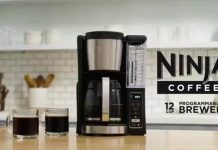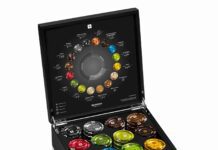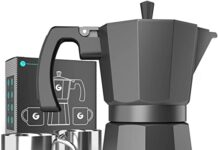Coffee lovers often find themselves torn between using filtered or unfiltered water in their coffee makers. The decision may appear insignificant, but it can actually make a significant difference in the taste of your morning brew. In this article, we explore the pros and cons of using both types of water and provide you with valuable insight to help you make the best choice for your coffee-making experience. By the end, you’ll have a clear understanding of whether filtered or unfiltered water is the key to unlocking the perfect cup of Joe.
Benefits of Using Filtered Water
Improved taste
Using filtered water in your coffee maker can greatly enhance the taste of your daily brew. The filtration process helps to remove any impurities or off-flavors that may be present in tap water, resulting in a cleaner and more enjoyable cup of coffee. Without the presence of unwanted elements, the natural flavors of the coffee beans can shine through, providing a richer and more satisfying experience for your taste buds.
Removal of impurities
One of the key advantages of using filtered water in your coffee maker is the removal of impurities. Tap water often contains various contaminants such as chlorine, sediment, and heavy metals, which can affect the taste and quality of your coffee. Filtering the water prior to brewing eliminates these impurities, ensuring a cleaner and purer cup of joe.
Reduces mineral buildup
Filtered water can also help in reducing mineral buildup in your coffee maker. Over time, minerals like calcium and magnesium can accumulate in the internal components of your machine, leading to clogs, reduced efficiency, and even potential damage. Using filtered water can minimize the amount of mineral buildup, prolonging the lifespan of your coffee maker and keeping it in optimal working condition.
Benefits of Using Unfiltered Water
Convenience
Using unfiltered water in your coffee maker can offer a certain level of convenience. If you have a busy lifestyle and don’t have the time or resources to invest in a separate water filtration system, using tap water directly can be a quick and easy solution. It eliminates the extra step of filtering the water before brewing and allows you to simply fill up the reservoir and start brewing your coffee.
Preservation of coffee machine parts
Believe it or not, using unfiltered water can actually help in preserving certain parts of your coffee machine. Some coffee makers, especially those with built-in water reservoirs, are more prone to damage caused by mineral buildup. Unfiltered water contains minerals that can create a protective layer on the internal components, potentially reducing the risk of corrosion and extending the life of your machine.
Health benefits
While filtered water is generally considered healthier for consumption, unfiltered water may offer some unique health benefits when used in your coffee maker. Tap water contains minerals like calcium and magnesium, which are essential for the body’s overall health. Brewing coffee with unfiltered water can infuse these minerals into your cup, providing a natural source of nutrients. However, it is important to note that the mineral content in tap water can vary greatly depending on your location, so it’s advisable to use a water testing kit to ensure the quality and safety of your water.
Factors to Consider
Water quality
Before making a decision on whether to use filtered or unfiltered water in your coffee maker, it is crucial to consider the quality of your water. Different sources of water, such as tap water, mineral water, and well water, can vary in terms of taste, purity, and mineral content. Assessing the quality of your water will help determine whether filtration is necessary to achieve the desired taste and health benefits in your coffee.
Coffee machine type
The type of coffee machine you own can also play a role in deciding whether to use filtered or unfiltered water. Drip coffee makers, for example, are more susceptible to mineral buildup and may benefit from the use of filtered water to prevent clogs and maintain optimal performance. On the other hand, espresso machines and French presses may not be as affected by water quality, and the decision between filtered and unfiltered water may be based more on personal preference.
Personal preference
Lastly, personal preference is an important factor to consider. Some coffee enthusiasts may have a more discerning palate and prefer the enhanced taste that filtered water provides. Others may not notice a significant difference in flavor and may prioritize convenience or the potential health benefits of using unfiltered water. Ultimately, the choice between filtered and unfiltered water in your coffee maker should align with your individual preferences and priorities.
Water Quality
Tap water
Tap water is the most accessible and commonly used source of water for brewing coffee. However, the quality of tap water can vary greatly depending on your location. It can contain impurities like chlorine, sediment, and microorganisms, which can affect the taste and quality of your coffee. Using a water filter or filtration system can help remove these impurities and improve the overall quality of your tap water.
Mineral water
Mineral water, as the name suggests, contains naturally occurring minerals such as calcium, magnesium, and potassium. It is sourced from underground springs and goes through a filtration process to remove any impurities. While mineral water can provide a natural source of minerals for your coffee, it is important to note that the mineral content can vary among brands, so it’s recommended to check the label for specific mineral concentrations.
Well water
Well water is obtained from private wells or groundwater sources. It can have a distinct taste and mineral content depending on the geological characteristics of the area. Well water is not typically treated or filtered, which means it may contain impurities or contaminants that can affect the taste and quality of your coffee. If using well water, it’s advisable to invest in a water testing kit to ensure its safety and consider using a filtration system to improve its quality.
Coffee Machine Types
Drip coffee makers
Drip coffee makers are one of the most popular types of coffee machines due to their simplicity and convenience. They work by dripping water onto a bed of ground coffee, gradually extracting the flavors and producing a pot of brewed coffee. Drip coffee makers can be sensitive to the quality of water used, as mineral buildup from unfiltered water may affect the brewing process and result in clogs or decreased performance. Using filtered water in a drip coffee maker can help maintain its longevity and ensure consistent brewing.
Espresso machines
Espresso machines, whether manual or automatic, are designed to extract coffee flavors by forcing hot water through finely ground coffee beans. These machines typically have built-in water reservoirs and may require regular descaling to remove mineral buildup. Depending on the water quality in your area, using unfiltered water in an espresso machine may expedite the need for descaling and potentially affect the taste of your espresso. Filtered water can help minimize these issues and ensure optimal performance.
French press
The French press is a classic and beloved brewing method that involves steeping coffee grounds in hot water before pressing them to extract the flavors. The simplicity of this method means that water quality has less of an impact on the resulting cup of coffee. Whether you choose to use filtered or unfiltered water in your French press largely comes down to personal preference. Some coffee enthusiasts may prefer the enhanced clarity and flavors that filtered water provides, while others may enjoy the nuanced characteristics that unfiltered water can bring.
Effects on Taste
Filtered water enhances flavor
Using filtered water in your coffee maker can have a significant impact on the taste of your coffee. By removing impurities and unwanted flavors, filtered water allows the true flavors of the coffee beans to shine through. The result is a cleaner, smoother, and more enjoyable cup of coffee with enhanced nuances and complexities. Coffee made with filtered water often exhibits a brighter acidity, balanced sweetness, and a cleaner finish compared to coffee brewed with unfiltered water.
Unfiltered water may alter taste
On the other hand, using unfiltered water in your coffee maker may introduce unwanted flavors or alter the taste of your coffee. Tap water, for instance, can contain chlorine or other chemicals used in the water treatment process. These substances can give your coffee a chlorine-like taste or create off-flavors that mask the natural complexities of the coffee. Unfiltered water may also contain impurities or minerals that can affect the overall taste and aroma of your brew.
Impurity Removal
Filtering process
The filtering process in a water filtration system or pitcher typically involves the use of activated carbon or other media to physically and chemically remove impurities from the water. These systems are designed to target various contaminants, such as chlorine, sediment, and heavy metals, ensuring that the water used in your coffee maker is clean and free from unwanted substances. The filtration process can greatly improve the overall quality and taste of your coffee.
Common impurities in tap water
Tap water can contain a range of impurities that can affect the taste and quality of your coffee. Chlorine, which is commonly used as a disinfectant in water treatment, can give your coffee a harsh or astringent taste. Sediments, such as sand, silt, or rust particles, can create a gritty texture and cloudiness in your brew. Additionally, heavy metals like lead or copper may be present in tap water, which can be harmful to your health if consumed in high quantities. Filtering your water can help remove these impurities and ensure a cleaner and safer coffee brewing experience.
Mineral Buildup
Calcium deposits
Mineral buildup, often in the form of calcium deposits, can occur in coffee machines over time, especially if unfiltered water is used. In areas with hard water, which has a higher mineral content, the risk of calcium deposits is even greater. These deposits can clog internal components of your coffee machine, such as the pipes, valves, and heating elements, leading to decreased performance, reduced water flow, and increased maintenance requirements. Using filtered water can help minimize mineral buildup and prolong the lifespan of your coffee machine.
Effects on coffee machine
Mineral buildup caused by unfiltered water can have detrimental effects on the performance and functionality of your coffee machine. Clogs and blockages can impede the water flow, resulting in uneven extraction and potentially weak or underwhelming coffee. The internal components of the machine may also become less efficient due to mineral accumulation, affecting the overall brewing process. By using filtered water, you can reduce the risk of mineral buildup and ensure that your coffee machine operates optimally for a longer period.
Convenience
No need for additional equipment
Using unfiltered water in your coffee maker offers convenience, as it eliminates the need for additional equipment. Having a water filtration system or pitcher requires regular maintenance and filter replacements, which can be time-consuming and costly. With unfiltered water, you can simply fill up the water reservoir of your coffee machine directly from the tap, saving you both time and money.
Saves time on filtering
Another advantage of using unfiltered water is the time saved on filtering. If you’re always on the go or have a busy schedule, the extra step of filtering the water before brewing can be a hassle. By using unfiltered water, you can cut down the preparation time and enjoy your coffee without any delay. It’s a convenient option for those who prioritize speed and efficiency in their coffee-making routine.
Health Benefits
Added minerals
Unfiltered water, especially tap water, can contain essential minerals such as calcium and magnesium. These minerals are important for proper bodily functions and contribute to overall health. By brewing coffee with unfiltered water, you can introduce these beneficial minerals into your daily cup, providing a natural source of nutrients. It’s worth noting, however, that the mineral content in tap water can vary significantly depending on your location, so it’s advisable to use a water testing kit to ensure the quality and safety of your water.
Potential contaminants
While unfiltered water may offer some health benefits in terms of mineral content, it also carries the risk of potential contaminants. Tap water can contain microorganisms, chemicals, and heavy metals that can be harmful if consumed in high quantities. Filtering the water before brewing can help remove these contaminants and ensure that your coffee is safe to drink. It’s important to prioritize your health and consider the potential risks associated with using unfiltered water in your coffee maker.

































